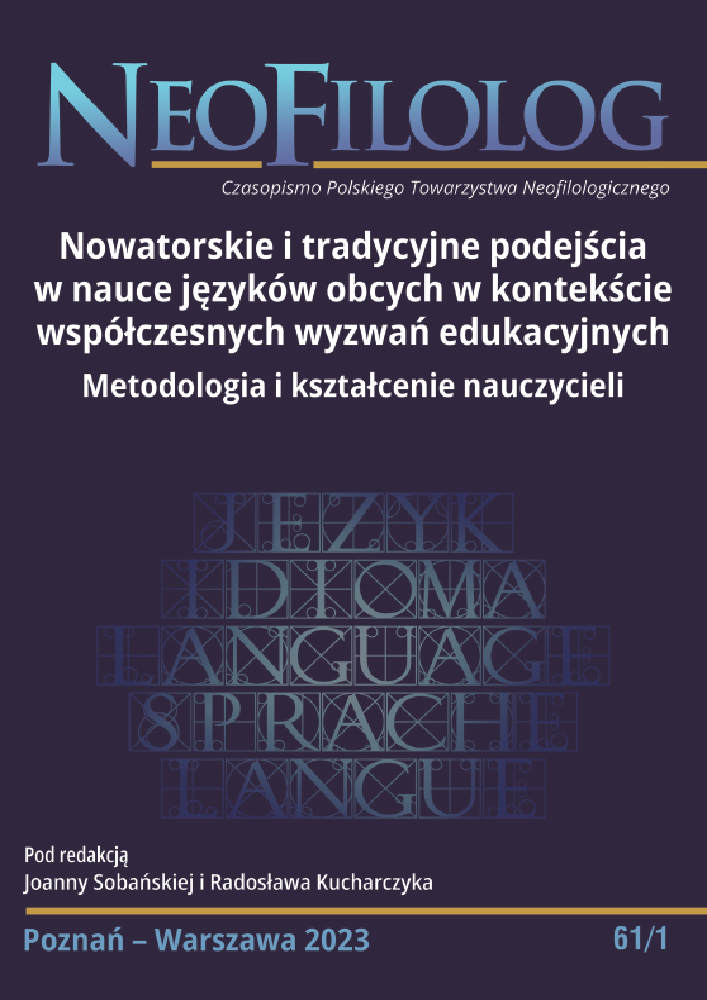Abstrakt
This paper presents a small-scale empirical study which included 21 senior-year students of German as a major who took a course on the methodology of teaching German as a foreign language in the spring semesters 2020 and 2021, at the Faculty of Philology at the University of Belgrade (Serbia). The students were encouraged to read several articles by the Austrian educational philosopher Konrad Paul Liessmann and to record their reflections on the possible effects of the commercialization of purpose-oriented knowledge. The articles in question are based on Liessmann’s so-called “Theory of Uneducation”. The students’ tasks were analyzed and discussed, with the focus on their statements regarding the following aspects: a) possible challenges, opportunities and dangers of unavoidable digitization and mechanization in everyday life and at school, and b) the changing roles and tasks in the educational context. All this more or less aims at application-oriented knowledge management. The participants supported Liessmann’s thesis that education is losing value through commercial exploitation, accumulation of TV quiz knowledge and extensive testing and examining. However, his skepticism with regard to digitization in the school system and his plea for more traditional canons of school subjects were mostly met with disapproval by the participants.
Bibliografia
Anderson R.D. (2004), European Universities from the Enlightenment to 1914. Oxford: Oxford University Press. DOI: https://doi.org/10.1093/acprof:oso/9780198206606.001.0001
Hörisch J. (2006), Die ungeliebte Universität. Rettet die Alma mater. München: Carl Hanser Verlag.
von Humboldt W. (1980), Werke in fünf Bänden. Schriften zur Anthropologie und Geschichte. Herausgegeben von Andreas Flitner und Klaus Giel. Stuttgart: Cotta´sche Buchhandlung.
von Humbolt W., Adorno T., Lisman K.P. (2020), Od obrazovanja do neobrazovanja. Tri teorije. Beograd: Akademska knjiga & IFDT.
Hüther G., Heinrich M., Senf M. (2020), #Education for Future. München: Goldmann Verlag.
de Konenk T. (2007), Filozofija obrazovanja. Beograd: Clio.
Komenski J. (1997), Velika didaktika. Beograd: Zavod za udžbenike i nastavna sredstva.
Lederer B. (Hrsg.) (2013), „Bildung“: was sie war, ist, sein sollte. Zur Bestimmung eines strittigen Begriffs. Fortführung der Diskussion. Baltmannsweilser: Schneider.
Lederer B. (2014), Kompetenz oder Bildung. Innsbruck: innsbruck university press.
Liessmann K.-P. (2010), Theorie der Unbildung. Die Irrtümer der Wissensgesellschaft, München: Piper Verlag.
Precht R.D. (2013), Anna, die Schule und der liebe Gott. Der Verrat des Bildungssystems an unseren Kindern. München: Goldmann Verlag.
de Romilly J. (1991), Écrits sur l´enseignement. Paris: Édition de Fallois.
European Bildung Network (2020), “Bildung”. Online: https://europeanbildung.net/bildung/
Rousseau J.-J. (1762), Émile ou l’éducation. Livres I et II. Online: https://ebooks-bnr.com/ebooks/pdf5/rousseau_emile_ou_education_livres1et2-a5.pdf [abgerufen am 23.8.2022].
Quellenverzeichnis für Liessmanns Artikel und Aufnahmen (letzter Aufruf im August 2022):
„Was ist Bildung? Von welcher Lebensschulung profitieren unsere Kinder?“ https://bildung-wissen.eu/wp-content/uploads/2019/09/Liessmann-9-2019.pdf
„Der Wert der Bildung und die Bildung von Werten“ https://www.ufg.at/fileadmin/media/institute/kunst_und_gestaltung/bildnerische_erziehung/materialien_und_links/Einzeltexte/Referat_C.P._Liessmann.pdf
„Theorie der Unbildung. Die Irrtümer der Wissensgesellschaft“ (Kapitel: „Wer wird Millionär oder: Alles was man wissen muss“) https://homepage.univie.ac.at/konrad.liessmann/Unbildung.pdf
Geisterstunde: Die Praxis der Unbildung (Kapitel: Pisa, Panik und Bologna) https://files.hanser.de/Files/Article/ARTK_LPR_9783552057005_0002.pdf
Prof. Dr. Konrad Liessmann spricht über die Herausforderungen der Digitalisierung https://www.youtube.com/watch?v=J7HQpFk7REA&t=193s
Konrad Paul Liessmann: Die verblassende Idee von Bildung (NZZ Standpunkte 2014) https://www.youtube.com/watch?v=IPRuOxSZLVg&t=1223s
Licencja
Prawa autorskie (c) 2023 Olivera Durbaba

Utwór dostępny jest na licencji Creative Commons Uznanie autorstwa – Bez utworów zależnych 4.0 Międzynarodowe.
Przedstawiany utwór (artykuł) upubliczniany jest na podstawie umowy z autorem i na licencji Creative Commons Attribution-NoDerivatives 4.0 International (CC BY-ND 4.0).
Użytkownicy mają obowiązek podania wraz z rozpowszechnionym utworem, informacji o autorstwie, tytule, źródle (odnośniki do oryginalnego utworu, DOI) oraz samej licencji;
- bez tworzenia utworów zależnych,
- utwór musi być zachowany w oryginalnej postaci.
Uniwersytet im. Adama Mickiewicza w Poznaniu zachowuje prawo do czasopisma jako całości (układ, forma graficzna, tytuł, projekt okładki, logo itp.).

